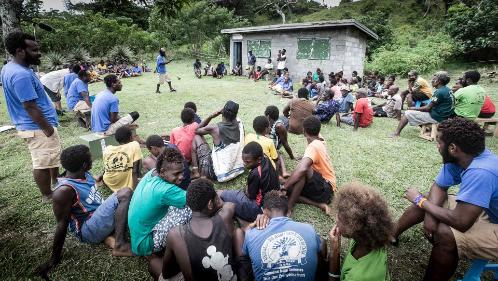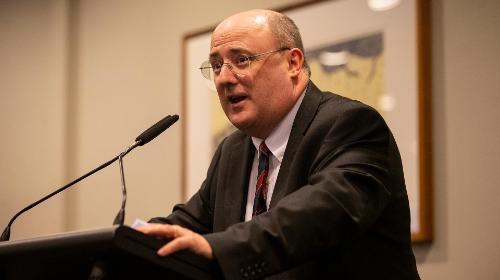ANCORS at UOW celebrates milestone

Twenty-five years ago, the Australian National Centre for Ocean Resources and Security (ANCORS) was established as a joint venture between the University of Wollongong (UOW) and the Royal Australian Navy to provide policy advice and training.
The mission of the Centre has broadened considerably over the years.
Today ANCORS work assists a range of organisations, including dealing with matters of piracy and illegal fishing in South-East Asia for the United Nations, feeding into Australia’s aid program in the Pacific and Africa, and addressing matters such as illegal fishing, drug trafficking and responses to climate change in the Indo-Pacific.

A fisheries workshop in Vanuatu hosted by ANCORS.
ANCORS has built a formidable reputation, attracting tens of millions of dollars in funding for research projects currently under way.
The reach of ANCORS is extensive, in 2019 its researchers will work in 54 countries.
Researchers from many backgrounds and areas of expertise including law, political science, marine biology and geography do research and capacity-building work for ANCORS, which currently includes 22 academic staff and 35 PhD students.
ANCORS alumni are pursuing some incredible careers, such as the current Chief of Navy, Vice Admiral Mike Noonan, and the incoming ambassador for the Solomon Islands to the United Nations, Dr Transform Aqarou.
Over the years, ANCORS has played a vital role in policy-making, including assisting in the drafting of key international agreements, such as the Western and Central Fisheries Convention, the largest fisheries agreement in the Asia Pacific.

Professor Kaye at the 25-year anniversary dinner in October.
“That agreement is very important in ensuring Pacific tuna stocks are not degraded and damaged,” ANCORS Director Professor Stuart Kaye said.
ANCORS staff were engaged in a range of significant projects, such as one to assist small island communities in Kiribati, the Solomon Islands and Vanuatu better manage the fish stocks they rely upon to live, or to improve food systems to ensure Pacific Islanders get better access to fresh produce. ANCORS is also combining with Google to use satellite vessel tracking data to improve fisheries compliance.
“All our projects are about protecting and better managing the oceans, which are so crucial to the health of our region and the wider world,” Professor Kaye said.
Professor Kaye said the media’s heightened focus on the ocean in recent years due to climate change has helped ANCORS to secure more funding for the work it has been focused on from its beginning.
ANCORS researchers are working with the UN to prevent plastic debris from entering the Pacific Ocean.
“The same issues have existed for quite some time, but people are more alive to them. Some of the attention it attracts now is very welcome because there’s greater investment from government and international organisations to combat these problems,” he said.
As ANCORS celebrates a significant milestone, having hosted a well-attended dinner in October, there is little doubt that the work of its academics and researchers will continue to make ripples for years to come.
“I’d like ANCORS to continue to make a difference in the management of oceans around the world,” Professor Kaye said.
“There’s a lot of important work that needs to be done in the Pacific, if things go wrong there the small island, developing states are very exposed, they have small economies, growing populations and their reliance on the ocean is huge. The work that we do there is very satisfying.”






